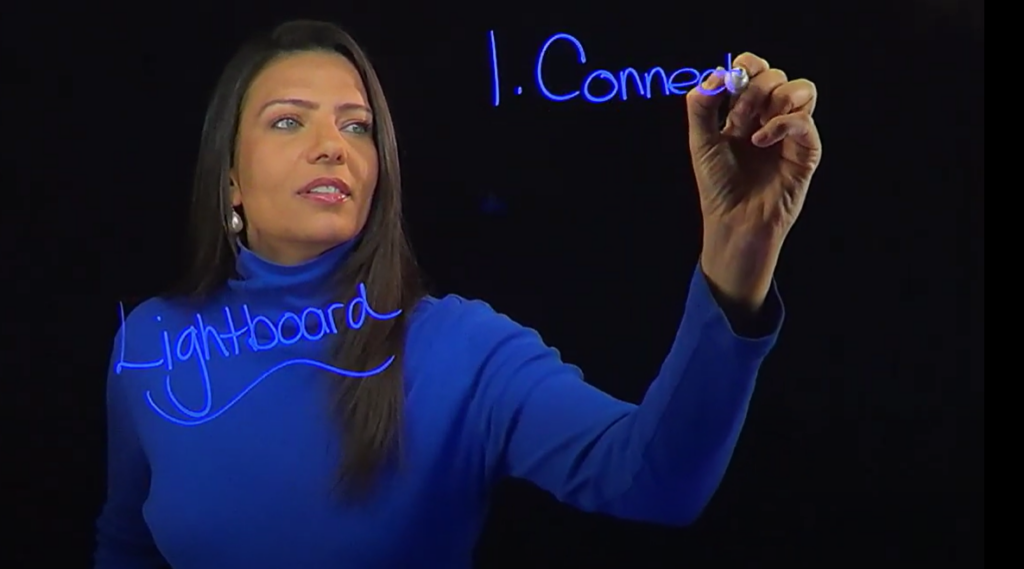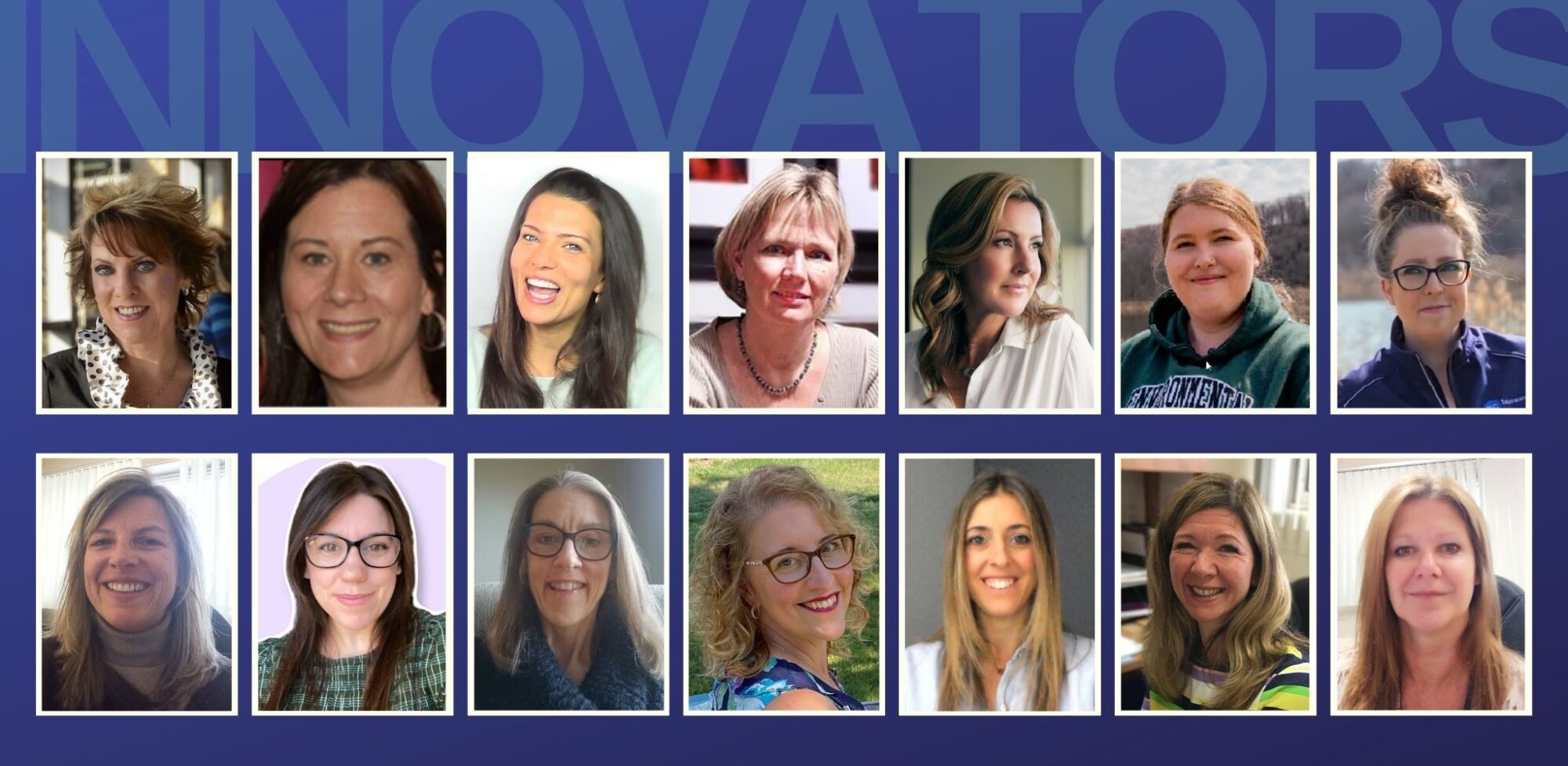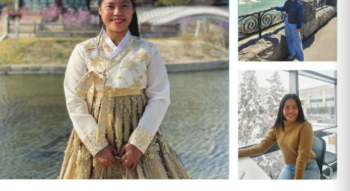Fifteen women who found remarkable ways to innovate aspects of their work or create new opportunities for the Niagara College community became the first recipients of the President’s Award for Innovation in Student Learning and Success this spring.
The Award celebrates the outstanding efforts of individuals and teams at NC who have made an impact on student engagement, learning, or success.
Five innovations were recognized during Day of Reflection, April 29, for supporting NC priorities. Among them: applied learning, inclusion, community impact, sustainability, accessibility, and the whole student.
“There has been great innovation happening at Niagara College and it’s important to both celebrate and nurture it,” said President Sean Kennedy as he announced the award recipients. “Congratulations to this terrific inaugural group of winners. You’re an inspiration to all of us and you make our college better.”
Nominations were adjudicated by a 10-member committee comprised of faculty members, staff, administration, and the Niagara College Student Administrative Council.
Winners’ names and innovations will be displayed on a plaque on an award wall on campus. Each winning innovation was also awarded $1,000 to support professional development or help advance the innovation in a meaningful way.
Virtual Innovation in Esthetician Retailing

School of Hospitality, Tourism and Sport Professors Susan Paone and Lisa Maurice were selected for a President’s Award for Innovation for creating an impactful experiential learning opportunity to prepare Esthetician program students for the new, digital era in the spa industry.
“Innovation is important to our program and the College because it creates an environment that encourages critical thinking and flexibility,” Paone said. “Innovation really helps the students and the College develop stronger relationships with industry partners and the community. Innovation pushes the boundaries and encourages out-of-the box thinking for both the students and us as faculty.”
Students worked with spa supplier, TheraGenesis, to develop digital content for their web and social media platforms. The experience provided mentorship from their teachers and industry experts, and also allowed them to transform their communication skills through branding, social media, video and image capture, and digital communication.
Lightboard
When the onset of the COVID-19 pandemic moved Shauna Gupta’s classroom online, she missed the connection she had with the students she was used to seeing every day.
That’s when the English for Academic Preparation professor turned to YouTube to learn more about an educational technology tool she’d heard of before: a lightboard.
A lightboard is a transparent whiteboard that’s made of glass and illuminated around the edges so the writing on it glows. The glass is positioned between the speaker and a camera; when the presenter is being filmed writing on the lightboard, the image is mirrored so the viewer sees the writing correctly.
With her boyfriend’s help, Gupta set out to construct a lightboard that she could use to reconnect her with her students and make their online learning experience better.
She spent about $350 in material and researched the design on the Internet. When it was ready, she started a YouTube channel called Grammar Glass and created about 20 grammar lesson videos with the help of the lightboard.

“[My students] loved it; they thought it was so cool,” she said. “They really loved that their teacher was putting in so much effort and that I was inspired.”
The judges for the President’s Award for Innovation agreed. Now Gupta would like to see Niagara College have its own lightboard studio.
Even with on-campus teaching, Gupta said Niagara College could still benefit from having a lightboard studio where faculty members could teach live or remotely.
Having a lightboard studio could also create opportunities for students enrolled in other programs at the College, including those in the School of Media.
“Lightboard technology has the potential to be a powerful piece of Niagara College’s new strategic vision, presenting Niagara College as a leading-edge, trailblazing academic destination,” Gupta said.
Entrepreneurial and Experimental – New realms of discovery
Cammie Jaquays and Melanie Sodka, professors in the School of Business Management Studies, have spent the last few years working on a strategy to expand entrepreneurial learning to help students develop new ventures. For that, they were selected to receive a President’s Award for Innovation.
Entrepreneurship is the leading occupation choice for Business Management studies students, so staying relevant is important, Sodka said.
“[It’s] imperative to ensure that NC remains competitive as the institution of choice for students wishing to explore their own business ventures.”
Added Jaquays: “Our strength lies in creating a participatory and unique strategy that aligns with the NC Strategic direction of being experientially focused and creative, innovative entrepreneurial thinking.”
Sustainability Ambassador Program

Led by student Lindsay Taylor and supported by Sustainability team members Taryn Wilkinson and Amber Schmucker, The Sustainability Ambassador Program empowers NC students to identify and execute their own sustainability-focused projects with mentorship from peers and college staff.
Because the program aims to provide students from a variety of academic backgrounds with the sustainability knowledge and tools to be leaders today and for years to come, judges felt it was worthy of a President’s Award for Innovation.
The program highlights the incredible opportunities that come from listening deeply to NC students, establishing a supportive community, and affording students the opportunity to create and lead.
“As a passionate environmentalist and community organizer, the Sustainability Ambassador Program is an essential bridge for students to cross their ideas from the classroom to on-campus and in-community action,” Taylor said. “NC Sustainability Ambassadors are already being recognized by our neighbours as being creative, solution-oriented, and genuine in their approach.
“This innovation has the potential to grow and blossom into a cross-functional inter-disciplinary program that activates sustainability at both Niagara College campuses.”
NC Virtual Preschool
To support experiential learning for Early Childhood Education students through the pandemic, staff and faculty from the ECE program developed a virtual preschool where students developed lesson plans and recorded activities that were shared with the community through a public-facing website.
Not only did the innovation provide a crucial learning experience for NC students, but these activities were also a lifeline for many parents and caregivers in the community who were without in-person daycare or kindergarten through much of the pandemic.
“As professors in the ECE program at NC, we teach our students that early childhood educators are lifelong learners who can face challenges, problem solve and take risks in meeting the needs of the children and families in their communities, said Angela Hayes, one of seven innovators behind the virtual preschool. “Innovation provides new opportunities for educators and learners to be curious and investigate new ways to build and apply our knowledge and skills. It allows us to move out of our comfort zone and explore new territory to share with others. We take the responsibility of modelling this to our students.”
Lindsay Milligan, Cathy Teixeira, Kelly Wilcox, Drew Kean, Jodi-Lynn Noble, and Wendy Coxon joined Hayes in developing the virtual preschool—an innovative idea worthy of a President’s Award for Innovation.
Kennedy announced the new President’s Award for Innovation in Student Learning and Success in January 2022 and encouraged employees to nominate themselves, their team or their colleagues. Up to five awards will be distributed annually.
“Niagara College employees are the driving force behind our spirit of innovation and improvement, designing, implementing, and refining our processes to better support our students,” Kennedy said. “The President’s Award for Innovation in Student Learning and Success is one way for us to recognize and celebrate [these] extraordinary efforts.”



